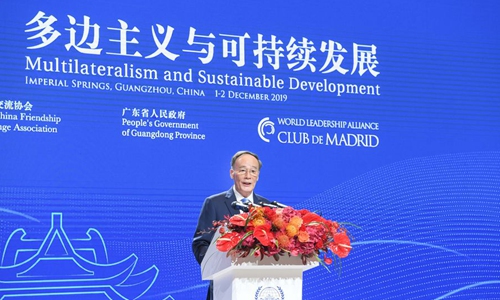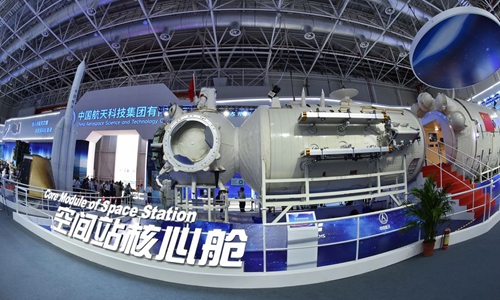
Nicholas Rosellini Photo: Li Qingqing/GT
Editor's Note:Unilateralism is on a global upsurge. As the United Nations (UN) embodies international society's pursuit of multilateralism, what solution can it provide to deal with unilateralism? How can China and the UN cooperate to maintain multilateralism worldwide? Global Times (GT) reporter Li Qingqing talked to UN Resident Coordinator in China Nicholas Rosellini (Rosellini) about the issues on December 4.
GT: Since its founding, the UN has contributed greatly to world peace and stability. But given the rise of populism and unilateralism now, how would you describe the situation of multilateral cooperation globally? Is it facing a temporary setback or could it be in retreat for a long run?
Rosellini: I think all of us have to accept the fact that at the moment, multilateralism is under a lot of pressure. But at the same time, we see an increasing need for multilateralism. We see the challenge of climate change, inequality in the world, unbalanced development between different countries and within countries, and the challenge of achieving The 2030 Agenda for Sustainable Development and the 17 Sustainable Development Goals (SDGs). On one hand, the 2030 Agenda needs a global approach. On the other, there is pressure on multilateralism.
We have to recreate the coalitions which accept that the global challenges need global solutions. We also need multilateral platforms to deliver these solutions. Indeed, multilateralism is under pressure, but if we reexamine where the demand for these global solutions is, and how to update the multilateral platforms to make them relevant again, I think we can make sure that multilateral approaches can continue to be the choice of countries around the world.
GT: UN Secretary-General António Guterres said, "The world is fracturing, but no country can repair the cracks in isolation." As unilateralism raises its head, what is the UN's solution to cope with it?
Rosellini: We have to redemonstrate that multilateral platforms can still deliver durable global solutions to some of the challenges we are facing. That means we have to be willing to reform, and we have to be willing to listen to the citizenry of the world. The year 2020 sees the 75th anniversary of the founding of the UN, and Guterres is launching a major worldwide campaign to encourage people to participate in the global conversation about the future of multilateralism, the future of the UN and how we need to change to be relevant in the future.
We know there are questions that we need to address as a global community, and we know the UN can contribute to addressing some of those challenges. We just have to make sure that we are relevant to address the challenges.
GT: Chinese Premier Li Keqiang said during his meeting with Guterres in November that China will continue to uphold multilateralism in the context of complex international situations. How can China and the UN cooperate to maintain multilateralism worldwide?
Rosellini: China has already become a very important member of the UN. China is a permanent member of the UN Security Council, the second-largest contributor to the UN regular budget and the leading contributor to peacekeeping both in terms of money and personnel. So, China really has an important role in the UN. Looking ahead, we want to see that role continue to grow, and we see the importance of collaboration with China.
China, as the second-largest economy in the world, has an important development impact on the rest of the world. We want to explore the opportunities in terms of China's South-South Cooperation as well as its investment in developing countries to see how we can support their alignment with the SDGs.
If we look at China's engagement with the world, some of it is through the UN, and some of it is with countries bilaterally. It is important that we see how to support both China and the partner countries in terms of using the available resources in a way that supports the implementation of the SDGs. The recent Belt and Road Forum, for example, is a very strong commitment to align the Belt and Road investments with environmental, economic and social sustainability. China plays an important role in politics and peacekeeping in the world. I think it will also play an important role in development.
GT: The 2019 UN Climate Change Conference, known as COP25, kicked off in Spain on December 2. It discussed whether the promises of the Paris Agreement would be fully implemented. The US has quit the Paris Agreement, to what extent will this affect the global fight against climate change?
Rosellini: There is no doubt that we need a big push in accelerating the global effort against climate change. We really need to understand and take actions in terms of the extent of the climate emergency we are facing, and it really needs the contribution of all countries. The level of carbon dioxide in the atmosphere is well above the limits we are trying to set, which hasn't been seen in 2 or 3 million years. Emissions continue to rise year on year. We are not meeting the Paris Agreement commitments, and we are far away from being able to increase those commitments. The prospect of reaching a global warming stabilization level is quite remote at the moment. This is really worrying for the future of the planet and humanity. As we look ahead, it is important that we do see how we can increase commitments from all countries, in or out of the Paris Agreement.
But of course, we have to recognize these differentiated responsibilities, and we have to take into account the relative economic strength of different countries and the historical level of emissions, so that we can have equity in how the reductions are applied. We hope that we can bring all countries in.
GT: You said in October that China's vast experience in dealing with agricultural development challenges, increasing income and avoiding environmental damage is a great resource for the whole world. How can China's experience align with UN 2030 Agenda?
Rosellini: China has experience in developing the agricultural sector, agro-industry and the whole agriculture value chain, particularly since the country's reform and opening-up. In the UN 2030 Agenda, there are SDGs about eliminating poverty, hunger and ensuring food security for all. China has already made great contributions in these areas. When we look ahead to the next 10 years, we can see how these experiences can help other countries achieve the elimination of rural poverty and food security.
The question is how can China's experience be customized to be relevant to other countries? China is a vast country. If things in China are scaled up, they need to be brought down to scale in other smaller countries, with different systems of governance and culture.



